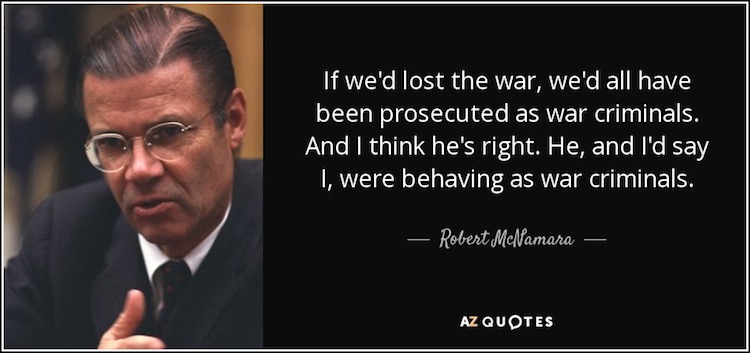Viewpoint by Jonathan Power*
LUND, Sweden (IDN-INPS) – Out of the blue the war in Vietnam is in the news. Yet it is not the fiftieth anniversary of America’s defeat in Vietnam when North Vietnam caused it to flee. It’s only the forty-second.
Part of this must be fearful parallels with the moral and strategic blindness of President Donald Trump who seems to believe in uttering his life and death rhetoric, akin to President Richard Nixon’s on Vietnam, hoping to frighten the enemy into submission – in this case North Korea. Many people are worried that Trump is ready to fight America’s biggest war since Vietnam. As did Henry Kissinger, Nixon’s National Security Advisor, he appears to be considering the use of nuclear weapons.
The second reason for Vietnam-consciousness are the rave reviews that are being given to Ken Burns and Lynn Novick’s ten-part documentary on the Vietnam War. It is being mentioned all over the place.
To my mind, one of the big questions is: is Trump ready to be branded a war criminal by present and future generations? That is what happened over Vietnam to Nixon and Kissinger. And before them, under Presidents John F. Kennedy and Lyndon Johnson, when Robert McNamara, their Secretary of Defence, wound the war up to where half a million American soldiers were deployed. Later, repentant, he publically branded himself as a war criminal.
For McNamara-at-war helicopter gunships flaming out napalm that set alight everything in its path – villages, men, women and children – were de rigueur, a necessary tool in the fight to hold back communism. If South Vietnam fell, so, like dominoes, would one Southeast Asian country after another. A ridiculous assumption as time showed.
Eventually McNamara saw, as the North gained in strength despite the American onslaught, that U.S. policy was built on an illusion. His son, an anti-war activist, got at his conscience. Finally, an act of self-immolation by a protestor right outside his office managed to get under his thick amoral skin. He resigned without explanation. As a reward for going quietly, Johnson made him president of the World Bank.
He told a confidante, the economist and writer, Barbara Ward, that he “bled inside for Vietnam”. In turn she told me and the words became the first public sign of the agony he felt as I repeated them in my column in the International Herald Tribune.
Only after his term of office at the Bank ended, did he turn again to the unfinished business of the Vietnam War. He went to thoughtful seminars with historians. He opened up discussions with the victorious North Vietnamese so that their former political and military high command could sit down with their American counterparts and talk frankly.
At the same time, he campaigned against nuclear weapons whose possession in large numbers he had so valued while Secretary of Defence. Then came his bombshell when he described himself as a war criminal – not just because of Vietnam but also, he said, for his time as a young strategic planner during the Second World War when he helped formulate the need for the use of nuclear weapons against Japan.
What would have happened if the International Criminal Court, established to try those who have committed crimes against humanity, had existed? Would a “sinner” who so publically denounced himself and worked so hard to rid the world of war been arrested, tried and imprisoned? Perhaps he would have wanted it.
Towards the end of his life he became so determined to do everything within his power to redeem his earlier mistakes that to become a public martyr in a court where he would have had a platform to speak and be heard like in no other place might well have appealed to his deep sense of humility, helping redeem a life in which he had spent a good part of it in two dreadful acts of destruction.
In 1971 General Telford Taylor, who had been the chief prosecutor at the Nuremberg trials of the top Nazi officials, said that if the standards of Nuremberg were applied evenly and applied to the American statesmen and bureaucrats who designed the Vietnam War “then there would be a very strong possibility that they would come to the same end” as the Nazi leaders.
As Christopher Hitchens wrote in his book, The Trial of Henry Kissinger, “It is not every day that a senior American soldier and jurist delivers the opinion that a large proportion of his country’s political class should probably be hooded, blindfolded and dropped through a trap door at the end of a rope.”
I hope against hope that some of Trump’s advisors are warning him of the personal consequences of a rush to war with North Korea. [IDN-INPS – 26 September 2017]
*Note: For 17 years Jonathan Power was a foreign affairs columnist and commentator for the International Herald Tribune – and a member of the Independent Commission on Disarmament, chaired by the prime minister of Sweden, Olof Palme. He is the author of a newly published book, “Ending War Crimes, Chasing the War Criminals” (Nijoff). He also authored “Like Water on Stone- the History of Amnesty International” (Penguin). He forwarded this and his previous Viewpoints for publication in IDN-INPS. Copyright: Jonathan Power.
Image credit: azquotes.com
IDN is flagship agency of the International Press Syndicate.
facebook.com/IDN.GoingDeeper – twitter.com/InDepthNews

